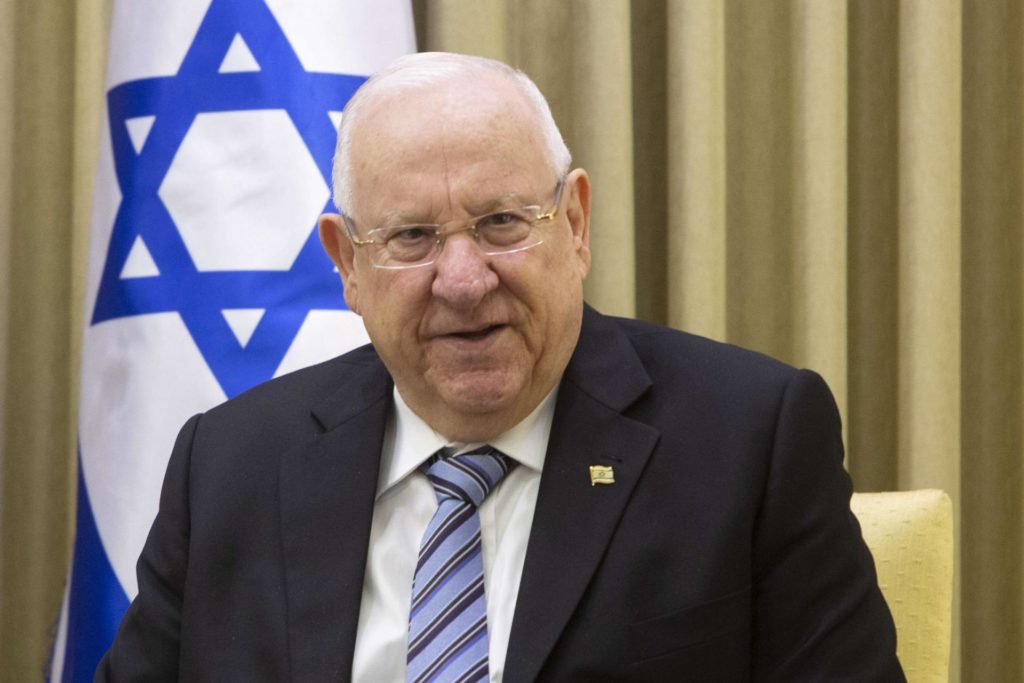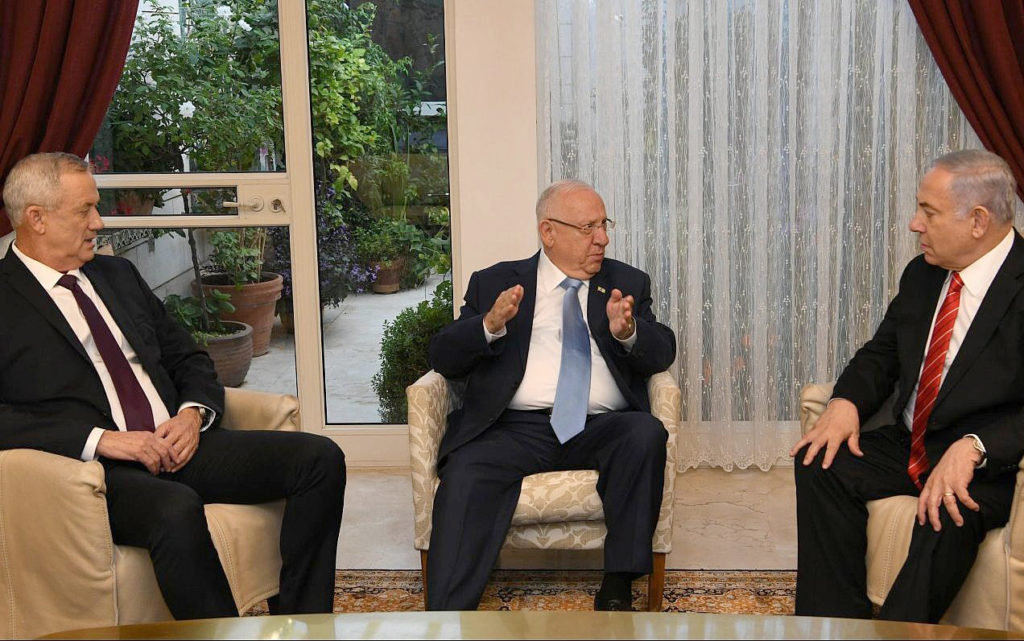Australia/Israel Review
Rivlin’s odyssey
Feb 26, 2020 | Amotz Asa-El

Out of Australia, into a political maelstrom
“The only place where I am allowed to put my nose is my handkerchief,” complained Israel’s first President, Chaim Weizmann.
The greatest Zionist statesman since Theodore Herzl was in the twilight of his years when Israel was established. He also did not belong to the ruling Labor Party. Even so, out of reverence for his record, he was elected president of the newborn Jewish state, which thus instituted the presidency as a symbol of the citizenry’s unity and the state’s authority.
The result was the creation of a ceremonial office whose holder meets foreign leaders upon their arrival in Israel, regularly meets with the prime minister, accepts foreign ambassadors’ credentials, formally appoints officeholders like judges or the governor of the Bank of Israel, and addresses official events like the opening of the new Knesset session or the annual ceremony to commemorate the Holocaust.
Israeli presidents also travel abroad to promote Israel’s foreign relations, in some cases very effectively. For instance, Weizmann’s visit to US President Harry Truman in the White House ten days after Israel’s establishment helped convince doubters that the Jewish state had become a firm reality. Similarly, Israel’s fifth president, Yitzhak Navon, visited Egypt in 1980 and addressed the ruling party’s leadership in Arabic, thus helping consolidate Israel’s young peace with Egypt.
Less dramatically, and much more regularly, Israeli presidents visit friendly countries, including Australia, where the sixth president Chaim Herzog arrived in 1986, the eight president Moshe Katsav visited in 2005, and President Reuven Rivlin was due to arrive late February.
A planned visit to Australia four years ago was cancelled abruptly as Rivlin was rerouted for a meeting in Moscow with Russian President Vladimir Putin, under circumstances that have never been fully disclosed.
That turn of events, which upset both Australian officials and the Australian Jewish community, was obviously not a result of a decision by Rivlin. An Israeli president’s journeys abroad, like those of the British Queen, are approved by the government, as are any cancellations. That certainly went for the Australian cancellation, which, it is widely assumed, was Prime Minister Binyamin Netanyahu’s decision as part of his broader, and delicate, relationship with Russian President Vladimir Putin.
Rivlin was to be greeted in Canberra by Governor-General David Hurley before meeting with Prime Minister Scott Morrison and other senior officials. In Sydney, he was to meet New South Wales Governor Margaret Beazley and visit the Garvan Institute where Israeli and Australian scientists conduct joint cancer research.
Rivlin was also scheduled to visit areas in the ACT afflicted by the recent bushfires, and meeting Victorian Governor Linda Dessau. As is customary in such visits, Rivlin was joined by a delegation of business leaders, who used the occasion to promote bilateral deals, while the President also visited Jewish communities and attended fundraising functions.
He had a short stopover in Fiji, designed to help consolidate improving ties in recent years between Israel and Pacific island nations.
Yet hectic though this journey will doubtless have been for him, it will be easier than the challenge that awaited him once he returned home. With the March 2 general election looming amidst a year-long political crisis, he will soon likely face the most testing situation of his seven-year term in office, which ends next year.
Israeli presidents have only two genuine executive functions: they can pardon convicted criminals, and they select the prime minister. While the exercise of the power to pardon is fully up to them, asking someone to form government after an election is meant to be primarily a formality – and ordinarily it indeed is.
The process begins with all the parties elected to the Knesset visiting the president and officially informing him or her which lawmaker they think should be prime minister. The president then summons the legislator who received the recommendations from the factions representing the largest number of Knesset members and asks him or her to form a government. After the nominee forms a coalition and wins the Knesset’s approval, the new cabinet visits the president for his or her formal approval and then begins its work.
In the approaching election, however, polls indicate that it is likely no candidate will be able to form a majority governing coalition. This is why last year’s two elections, on April 9 and Sept. 17, produced nothing but a third trip to the polls on March 2, 2020.
This impasse has two causes.
Mathematically, neither the bloc consisting of Prime Minister Binyamin Netanyahu and the conservative parties that orbit his Likud Party, nor that of Opposition Leader Benny Gantz’s Blue and White party and the Zionist parties to its left (this election running as a united list called “Emet”) have added up to a majority of the Knesset’s 120 seats.
Politically, two puzzle pieces don’t fit in either configuration. One is the right-wing, secularist Yisrael Beitenu party, headed by former defence minister Avigdor Lieberman.
This party’s electorate includes many Russian-speakers, and is hawkish on Israeli-Palestinian issues but staunchly liberal on religious policy questions. Yisrael Beitenu is now raising legislative demands – like much-increased conscription of ultra-Orthodox men – which Netanyahu’s religious partners, the United Torah Judaism and Shas parties, object to vehemently.
The other puzzle piece which is not part of either bloc is the United List, a federation of parties pitched at Israeli Arab voters, whose lawmakers include some outspoken and extreme anti-Zionists. These attitudes have made it impossible for either Netanyahu or Gantz to count them as potential coalition partners.
Hovering above this already complicated situation is Netanyahu’s legal predicament.
Unlike the last two elections, where he ran while a suspect, this time Netanyahu is running as a defendant, having been formally indicted on Jan. 28 on charges of bribery, fraud, and breach of trust in three different cases. Had it not been for this circumstance, the crisis could likely have been solved by creating a broad unity government.
However, Blue and White refused to sit in a Netanyahu government while a recommendation for indictment hung over him, saying he could not run the country in such a situation. Now, it cannot backtrack from that stance, given that the Prime Minister’s legal situation has only worsened.

Rivlin’s efforts to broker a unity government after the September election did not succeed
This, then, is where the President comes in, barring a decisive election result that no poll currently predicts.
There was a somewhat similar situation once previously in Israeli history, and the president of the day proved pivotal in its solution. It happened in 1984, when the election ended with the Knesset vote split evenly between the Likud-led and Labor-led camps. After long weeks in which the two major parties realised neither could form a narrow coalition, then-President Chaim Herzog summoned Labor leader Shimon Peres and Likud leader Yitzhak Shamir and coaxed them to agree to rotate the premiership between them.
It was an inventive idea that at first sounded bizarre, but then worked wonders, as the government the two led then succeeded in rescuing the Israeli economy from its worst crisis ever.
On the legal front, Herzog also set a precedent when he ended a cover-up scandal involving the head of the Shin Bet secret service, Avraham Shalom by granting him pretrial immunity in return for his immediate and full departure from public life.
After March 2, this kind of creativity will, in all likelihood, be expected of Rivlin.
An 80-year-old lawyer, widower, vegetarian, former Likud lawmaker and former Speaker of the Knesset, the humorous and outgoing Rivlin is popular – even among political opponents from the left, who appreciate his liberalism in general, and his defence of Israeli Arab civil rights in particular. But what history may now demand of him will be more profound than all these qualities.
After the September election, Rivlin tried to produce a magic formula, but unlike Herzog’s, Rivlin’s solution didn’t end up succeeding.
Rivlin suggested that Netanyahu and Gantz create a broad coalition in which Netanyahu would serve as prime minister first, but once indicted he would be declared “incapacitated” and make way for Gantz – who then would serve as acting prime minister, while Netanyahu would formally remain PM.
The two parties held negotiations on Rivlin’s proposal, and at one point Likud proposed that Netanyahu assume the premiership for five months and then hand over to Gantz. Blue and White ended up rejecting that idea, reflecting its leaders’ mistrust of Netanyahu whom they suspected might not keep his promise.
Now Rivlin’s previous proposal is no longer relevant because Netanyahu has already been indicted.
Israeli law allows an indicted prime minister (unlike any other minister) to serve until not only convicted, but until all appeals of that conviction have been exhausted.
Moreover, an immunity-for-retirement deal of the sort Herzog created for Avraham Shalom has been informally discussed with Netanyahu, only to be reportedly rejected.
No one seems to know just what kind of a rabbit Rivlin might manage to pull out of the presidential hat this time around. What all agree, however, is that if he somehow manages to cut the Gordian Knot of the current year-long Israeli political impasse, it will be the crowning achievement of an already successful presidency.
Tags: Australia, Benjamin Netanyahu, Israel, Reuven Rivlin






